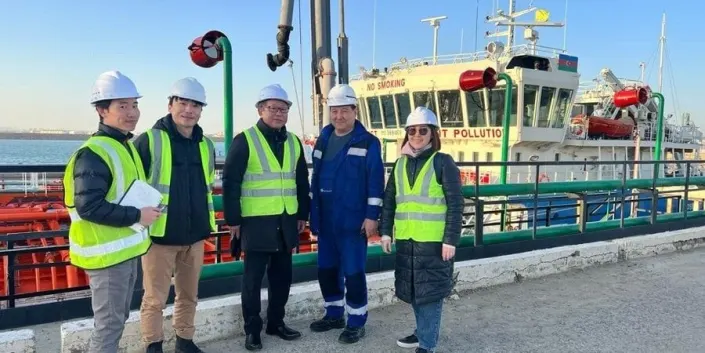Kazakhstan is making progress in its efforts to expand the export of crude oil through non-Russian routes, as part of its diversification strategy.
This week, Kazakhstan’s major oil transporter KazTransOil revealed that Inpex, a Japanese company, has moved 7,000 tonnes of oil from Kashagan, one of the world’s largest oil fields, to the Caspian port of Aktau via rail. The oil was subsequently transported across the Caspian Sea using a Kazakh-owned tanker and unloaded at a facility near the capital of Azerbaijan, Baku. Afterward, the oil was loaded into rail tanks and shipped to the Baku-Tbilisi-Ceyhan pipeline, which runs to Türkiye.
According to Hiroshi Ikeda, who heads Kazakhstan Branch Inpex North Caspian Sea, Ltd., the recent trial shipment demonstrated the potential for diversifying Kashagan oil export routes using rail transportation via the Trans-Caspian route. He further said that Inpex would continue cooperation to develop reserve export routes together with the government of Kazakhstan and KazMunayGas.
The diversification of crude oil export routes away from Russian territory is a crucial aspect of Kazakhstan’s economic plan. Following Russia’s invasion of Ukraine, there has been mounting concern that Kazakhstan’s reliance on cooperation with Russia, which shares a long border of 7,644 kilometers (4,750 miles) and has a history of close political alignment, could put its oil supplies at risk.
Kazakhstan, a country rich in energy resources, exports 67 million tons of oil to Europe each year through Russia. The Caspian Pipeline Consortium (CPC), also known as the Tengiz-Novorossiysk pipeline, has been the primary means of transportation for Kazakh oil for the past two decades, covering a distance of 1,511 kilometers (939 miles) and granting access to the global market. The CPC pipeline is responsible for transporting more than two-thirds of Kazakhstan's oil exports.
However, in early July 2022, a Russian court banned Kazakh oil exports via Novorossiysk for 30 days, marking the third time that Russia restricted or threatened to restrict the operations of the CPC since March 2022.
Last August, Kazakh Prime Minister Alikhan Smailov revealed that starting from January 1, 2023, Kazakhstan will commence the export of 1.5 million tons of oil via the Baku-Tbilisi-Ceyhan pipeline. Furthermore, the possibility of expanding the export up to 6-6.5 million tons of oil is also being explored. As reported by Reuters, an extra 3.5 million tonnes of Kazakh crude oil could potentially be transported each year starting in 2023, using the Baku-Supsa pipeline that leads to the Georgian port of Supsa on the Black Sea.
Kazakhstan is currently the world’s ninth-largest crude oil exporter, holding three percent of global oil reserves and ranking as the third-largest oil producer in the Caspian region, following Russia and Iran. The country’s oil exports are heavily geared towards the European Union, which receives more than 70 percent of Kazakhstan’s total oil exports. As a result, Kazakhstan is already the EU’s third-largest non-OPEC oil supplier, with the bloc being a highly desirable market for energy exporters due to its limited domestic resources.







 Armenian sappers commenced on Monday mine-clearance operations in the territories adjacent to the Saint Mary Church in village of Voskepar (Armenia...
Armenian sappers commenced on Monday mine-clearance operations in the territories adjacent to the Saint Mary Church in village of Voskepar (Armenia...
 Russian Foreign Minister Sergei Lavrov has reasserted that Moscow has no intentions to stop the fighting in Ukraine, even if peace talks commence.
Russian Foreign Minister Sergei Lavrov has reasserted that Moscow has no intentions to stop the fighting in Ukraine, even if peace talks commence.
 Iran has refuted reports of alleged damage to Shimon Peres Negev Nuclear Research Centre located southeast of Dimona, Israel, during the recent air...
Iran has refuted reports of alleged damage to Shimon Peres Negev Nuclear Research Centre located southeast of Dimona, Israel, during the recent air...
 Iran’s Foreign Minister, Hossein Amir-Abdollahian, has labeled a foiled Israeli drone attack in certain parts of the country as a "failure" for Isr...
Iran’s Foreign Minister, Hossein Amir-Abdollahian, has labeled a foiled Israeli drone attack in certain parts of the country as a "failure" for Isr...



